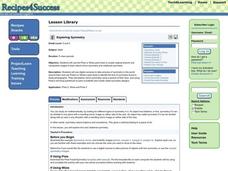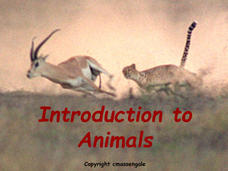Curated OER
Reflections of Symmetry
Students use video and the Internet to identify examples of bilateral and radial symmetry in the world around them. They create symmetrical reflection designs using pattern blocks and paper.
Curated OER
Symmetry
Students explore symmetry. In this geometry lesson, student identify and define bilateral symmetry, radial symmetry, pentagonal symmetry, hexagonal symmetry, and cubic symmetry. Students construct examples of these types of symmetry and...
Curated OER
Exploring Symmetry
Young scholars use a software program to create artwork and to manipulate images to study mirror and rotational symmetry. They take pictures of items in their environment in which they identify symmetry.
Curated OER
What is an animal?
For this animal worksheet, students determine which characteristic of an animal matches the given statement. Students describe illustrations of animals using the terms radial symmetry, bilateral symmetry, and no symmetry.
Columbus City Schools
Get Your Organisms Organized
From large to small, show your class how to organize them all! Included within the guide is everything you need to take their knowledge of classification from the cellular to the species level. The worksheets focus on building vocabulary...
Curated OER
Science and Math Lab (Students Look at Symmetry in Nature)
Students study patterns. In this symmetry in nature lesson, students examine objects to determine what type of symmetry they have. They work in small groups to rotate through stations that have objects for them to study.
Curated OER
A Side View
In this animal symmetry activity, students label organisms by the type of body symmetry that organism has. Then students draw an example of each type of symmetry. This activity has 3 drawings and 21 fill in the blank questions.
Curated OER
The Phylogenetic Tree
In this biology instructional activity, students label parts of a phylogenetic tree and differentiate between bilateral symmetry and radial symmetry.
Curated OER
Invertebrate Phyla
Students explore the invertebrate phyla. They discuss the characteristics of the invertebrate Phyla in the Kingdom Animal. Students classify organisms into Phyla based on their characteristics. They distinguish radial symmetry, bilateral...
Curated OER
Gardens Under the Sea: Coral Reefs
Students, with dive partners, explore coral reefs through scuba diving. They also explore radial symmetry and bilateral symmetry.
Curated OER
Body Plans and Adaptations
In this body plans and adaptations learning exercise, students will review the different types of symmetry found in organisms. Students will identify body parts as found on either the ventral or dorsal part of an animal. Then students...
Biology Junction
Introduction to Animals
Out of all animals, elephants alone lack the ability to jump. Scholars learn all about animals using a presentation full of fun examples. It describes different types of animals, the biological similarities and differences between...
Curated OER
Comparing and Contrasting
Students practice compare and contrast skills. In this science and language development lesson, students complete a T chart generating traits of a snail and a clam. Students complete a related worksheet.
Curated OER
Invertebrates
Students examine invertebrates. In this animal classification lesson, students discuss invertebrates and bilateral symmetry. They discuss the importance of horse shoe crabs in medical science.
Curated OER
Tackling Taxonomy
Students study physical characteristics of separate phyla and place them into similar groups. This lesson is part of a multi-segmented unit on the diversity of life. students develop a classification system by grouping animals into...
Curated OER
What is an Animal?
In this animal worksheet, students review various characteristics that are associated with animals including body plan and skeletal structure. This worksheet has 11 fill in the blank questions.
Curated OER
Keeping Us in Stitches Activity: Hexagon Quilt Top Design
Students examine how the hexagon shape can be a building block for quilt patterns. They view images of quilts, discuss symmetry and design patterns, and create and name an original quilt design.
Busch Gardens
Create an Invertebrate
What better way for young biologists to learn about invertebrates than by creating their very own? Here, students are assigned a set of invertebrate characteristics and are asked to invent an imaginary ocean animal and a separate...
Asian Art Museum
Create Your Own Samurai (Breastplate) Armor
Your class is going to love this activity. They get out their rulers, cardboard, and paints as they make Samurai breastplates. The simple art lesson lends itself to many different subjects such as, math/measurement, world history, and...
Curated OER
Animal Characteristics
Allow your students to review what they learned about animal characteristics with this PowerPoint. This slideshow includes 9 multiple choice questions and an answer key at the end. Tip: You can use this as an assessment by having your...
Curated OER
Fall 2003 Midterm Exam #3
Let there be light! When your physics learners take this midterm exam, light will be their focus. They will show what they know about electromagnetic waves, interference, refraction, reflection, lenses, prisms, and more! The test is...
Curated OER
Invertebrates
For this invertebrate worksheet, students review characteristics of the different types of invertebrates. This worksheet places 32 vocabulary words into a crossword puzzle.
Curated OER
Using a Dichotomous Key for Invertebrate Phyla
Learners use a key to determine the phyla of invertebrates. They are broken into groups and each group gets a stack of pictures and uses the key to determine which phyla the animal belongs to. There are also individual questions for...
Curated OER
Classification of an Echinoderm
High schoolers study starfish through dissection. In this biology lesson plan, students explore the lives of starfish as they view a slide show, observe parts of echinoderms, and compare the classification of the starfish with other...

























